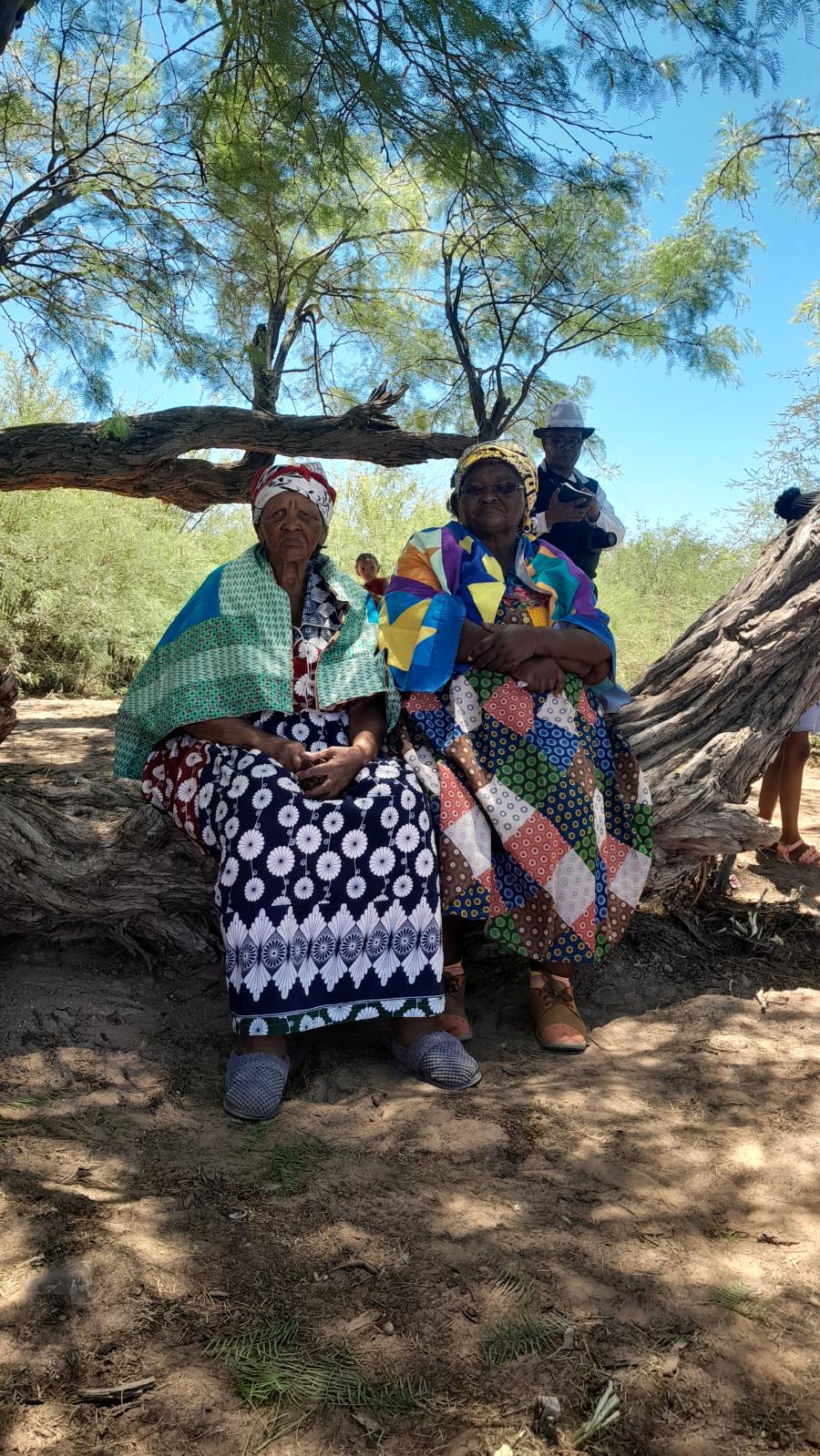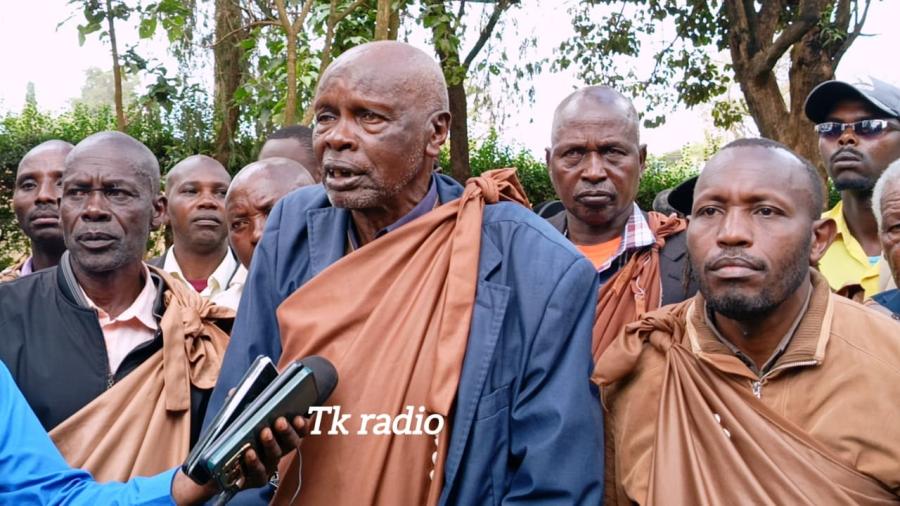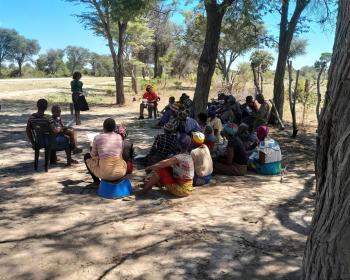A proposed game park in Namibia would force the last Ju/wasi off their traditional lands.
On Monday, June 4, a plan for the future of Bushmanland was submitted by the Department of Nature Conservation to the Administrator-General of Namibia. The plan calls for the proclamation of about 6,000 km² of Eastern Bushmanland from the Botswana border west for about 60 km As a nature reserve. The reserve will include all of the natural waterholes that remain to the Ju/wa Bushman people, all their traditional territories or N!ores with the bushfoods and game with which they are familiar. It will expropriate the only area of Bushmanland where the water table lies close to the surface. "Water we can reach with our hands, reach with our shovels. Our water, in truth," explained a Ju/wasi farmer.
In the nature reserve, Ju/wasi will be forbidden to keep their small herds of cattle with which they are beginning to support themselves. Today, three communities of Ju/wasi with their cattle are living at their traditional waterholes and territories in Eastern Bushmanland - the communities, averaging between 60-70 people and 35 cattle - have built kraals to protect the cattle and constructed mangles for stock inspection and innoculation. The products of husbandry - milk, milk products and occasional beef - contribute 15-30% of their diet. Family gardens supply mealies and melons, estimated at about 10% of the diet. Because the communities are relatively small, and there are enough older people who know how to hunt and gather in a country they have live in all their lives, bushfoods and game can still contribute about 20% of the diet. About 30% of the diet is provided by cash from the salaries of sons in the army or family members working for the Administration of Bushmanland. 10% of the annual diet, such as mealimeal, derives from other sources - welfare, army rations, rations for the sick and the old.
The people in the communities cannot survive by cattle husbandry, gardening, or hunting or gathering alone, or on cash - even with high army salaries. Their survival - like almost everyone in Namibia - depends on a mixed economy in which subsistence agriculture is combined with wage work. Cattle are the core of the subsistence which the people in the communities have developed to replace hunting and gathering and reduce their near complete and debilitating dependence on cash and welfare.
A mixed economy in which family members practice a variety of subsistence activities and others are employed, is essential for survival in developing countries like Namibia with low per capita income, high unemployment and few industries. The Ju/wasi today are no exception. At their own natural waterholes and shallow wells the communities are virtually independent of the expenses of maintaining deep boreholes. Such communities are setting an example for other Ju/wa groups. At least three other groups want to start subsistence husbandry at waterholes in Eastern Bushmanland. Directly and indirectly, the communities with their cattle support about 250 people. About 2,000 other Ju/wa people live idle, debilitated lives in little rural sums around Tshumkwe, the administrative capital of Bushmanland and at the army camps in Western Bushmanland. They are entirely dependent on the largesse of army rations and the salaries of about 160 Ju/wa soldiers.
Army incomes today in Bushmanland are breathtaking. In 1982 Ju/wa soldiers made R600/month and their families received rations, yet annual per capita income for the 2,300 Ju/wasi in Bushmanland was about R360 per year. For most Ju/wasi, even the present levels of cash income and welfare cannot provide an adequate diet. A family of 7 could each have almost a kilogram of mealimeal per day on a per capita income of R360/year; or one tin of meat and one vegetable among them per week and 6 kg of mealimeal per day - and so on. Cash and welfare are not evenly distributed. A great deal of money passes through the hands of a few young men: like young men everywhere they buy tape decks that break, cars that do not work. Ju/wasi are a society of haves and have nots in which most people have nothing to do and not enough to eat.
If the nature reserve is proclaimed, the communities and their cattle will be evicted from their waterholes and forced to move far to the west to expensive boreholes they cannot afford to maintain. Their lives will depend at best on the budget of a government - at worst on the whim of an official. They will be compelled to live in a country they do not know where bushfood and game are scarce or absent, and gifblaar is prevalent. Or they will be herded back to Tshumkwe, an area completely inadequate to support their mixed economy. Instead of setting an example of self-support they will join the dependent many. Instead of providing an answer for the future self-development of the Ju/wa people, they will become part of the problem. All hope of Ju/wa people participating as self-supporting citizens of Namibia will be lost.
"How can a government take away my land like this? - take away my living? What will I do without my cattle and my garden? Without bushfoods and mangetti nuts that are near. N/=amtchoa is my N!ore. It is my land to live on," dictated Black/Kwi in a recent letter to the Administrator-General.
For Ju/wasi the death blow of a nature reserve is not a figure of speech. It is not a metaphor for social disintegration and collapsing values. The death blow of dispossession means their lives.
The plan for the reserve is secret by I was assured by Conservation Department officials that Ju/wasi will be allowed to hunt with bows and arrows and gather with digging sticks "forever" in the reserve. Since children no longer know how to hunt and gather, these activities are to be taught in school. The reserve is designed for a "special class" of tourists who will be flown into selected campsites and taken on nature walks. Only 8 of the 34 guides will be Ju/wasi. Ju/wasi, presumably in skins, will be the main attraction. The nature reserve will "protect" the Bushmen so their land will not be taken from them by other people. Who would take their land, aside from the government is not indicated. The creation of the reserve will drive a few Ju/wasi back into a kind of subsidized, plastic stone age and another 2,000 out of Bushmanland. Where will they go? How will they make a living? "It took me all my youth to learn how to hunt," said a Ju/wa vehemently. "Where has it taken me? I can't hunt. I have to farm. I don't want my son to be a hunter. I want him to go to school and be a teacher or a farmer."
To protect Bushman people in a nature reserve is a perverse attempt to destroy them as a people or an idea based on a misunderstanding of the demographic, economic and social facts of hunting and gathering life ignoring what has happened to the Ju/wa people in the last 20 years.
* who have lost over 70% of the land they had occupied for at least 1,000 and probably more than 20,000 years…
* who were the last independent, self-sufficient hunters and gatherers in Southern Africa - still practicing their ancient way of life only twenty years ago…
* who now crowd apathetically into little rural slums around administrative, police, and army posts where most are dependent on government handouts…
* whose society has disintegrated because the livelihood of many consists of begging from the few who are employed by the administration or the military…
* who are riddled by tuberculosis and other diseases with mortality that is magnified by a deficient diet composed mainly of mealimeal, alcohol and sugar
* whose death rate often exceeds their birth rate…
* who do not have the education to compete for a future in modern Namibia…
* who in recent years have not received from their government any help or training to develop a viable subsistence economy to support themselves
* who, in spite of this neglect, and often in the face of official opposition, have made a positive start toward subsistence husbandry in their tiny corner of Namibia, only to live under the imminent threat of the plan to take the rest of their land for a nature reserve…
Bushman/San people are virtually extinct in the Republic of South Africa and all other surviving Bushman groups in Namibia - perhaps 27,000 people - are dispossessed of their land and living in extreme poverty. This is the context in which the nature reserve would evict the last 2,000 Ju/wasi from the last piece of their land.
They call themselves "the well-mannered people," but today their lives are marred by misery and violence. Crowded together in makeshift settlements and unliveable housing projects around the administrative town of Tshumkwe, and at police and army posts, most Ju/wasi live idle, debilitated lives.
In concentrated, sedentary populations, hunting and gathering is impossible. Instead, most Ju/wasi eat cornmeal - much of it made into beer - provided by welfare or purchased by cash trickling down from the few who have jobs with the government or serve in the military. Some children often have little more to eat than sugared water.
Poor nutrition shows up in widespread anemia and other deficiencies revealed recently by a South African medical team.
A deficient diet underlies a staggering death rate. In 1981, the 920 Ju/wasi living at Tshumkwe and the nearest army post experienced 30 births and 31 deaths. The deaths included 9 of the 12 babies born in government housing projects that year.
In spite of a sharply rising birth rate and the presence of a modern clinic at Tshumkwe, the Ju/wa population has probably declined over the past 20 years. By contrast, the Ju/wa population in Botswana - just 60 kilometers from Tshumkwe - is growing by 2.5% per year.
Increasingly, young Ju/wa men are being recruited into the army to fight against SWAPO (the South West African People's Organization). They are told that they are defending their land; they are deeply confused to find that they are serving a government that plans to expropriate their land for a nature reserve - for the benefit of the white tourists.
Ju/wasi have no Voice
At the beginning of this century the word Bushman referred to people who lived by hunting and gathering in the bush. Ju/wasi speak one of seven Bushman languages and dialects in Namibia that differ from each other more than European languages. Today for historic reasons social and economic differences have increased between people classified as Bushmen in Namibia. Ju/wasi are an example. They speak one of three dialects of !Kung, the north Bushman language. About 2,000 people who speak the southern dialect have been living in harsh poverty on the farms in the Gobabis district for 4 generations, as have about 5,000 Ju/wasi. Their social networks have collapsed, marriage with other peoples is preferred, their aspirations are to keep their jobs and endure the future. Their death rate has been high.
The !Kung in the north have been living with Ovambo and Kavango peoples for at least a century. Most have become assimilated and acculturated, raising cattle and other livestock and planting crops. Many families have had sons serving in the colonial army and police for generations. They fought for the Portuguese in the Angolan war of independence and are refugees in Namibia where they are professional soldiers with loyalty to their unit, their officers and their paychecks. The army has settled at least a thousand !Kung in camps in western Bushmanland and has respected the rights of Ju/wasi in eastern Bushmanland. Nevertheless, Most Ju/wasi fear the !Kung and can hardly understand a word they say. In a letter dictated "to the Administrator-General Kxao Demi wrote:
We are Ju/wasi and we wish that the white people will hear us. If they do their own thoughts [without hearing us] we do not want it. And we do not want that they [government] will take our lands and make a nature reserve because we want to have our cattle and donkeys and gardens and all things in our country. And the white people [here] do not listen to us. Therefore the nature reserve will finish us and ruin us. We are without work, without anything. We want to develop [//ei tseu - pull up] our land and do not want to go to a strange land because strange people [the Angolan Bushman soldiers] live there and we fear them and do not understand [their speech). Today it is as realistic to expect that the peoples classified as Bushman in Namibia can speak with one voice, or support common leaders, as it is to expect a United States of Europe by the end of the century. Yet because all "Bushmen" are lumped together by outsiders they are expected to represent themselves as a single people. Because Bushman peoples do not have a single voice they have no voice.
As/Xaesce G/= oma says,
We are Ju/wasi. We do not want a nature reserve. All Ju/wasi do not want a nature reserve., Where will they go?
When the whites wanted to make a nature reserve, they first told the Ju/wasi. But they did not tell us that no cattle, no gardens, nothing will be allowed in the reserve. Now they want to do the reserve by force. And Ju/wasi do not consent that the nature reserve will begin now.
Long ago Ju/wasi were without cattle. Now they have cattle. And this is Ju/wasi land.
And people are growing old, and they do not know where they will go, because now their children have cattle and the government wants the Ju/wasi to leave their land with their cattle and go to a strange land and people's hearts are sore because people will be destroyed. We will stay here.
Because this land is Ju/wasi land. And it is a little bit good. Without gifblaar.
And we know this land, and do not know strange places. We know where water is. And bushfoods. And a borehole, it loves money. One borehole costs R15,000.00. And if the borehole dies, what will we do? Without money?
We will stay [here] where God himself made the water.
I am finished.
Article copyright Cultural Survival, Inc.



